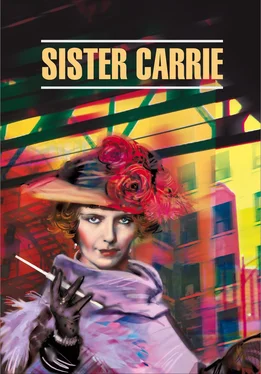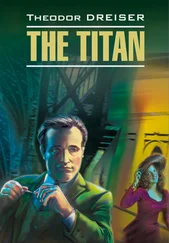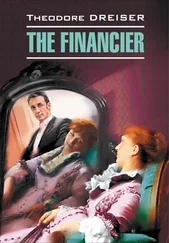There was a little ache in her fancy of all he described. Her insignificance in the presence of so much magnificence faintly affected her. She realized that hers was not to be a round of pleasure, and yet there was something promising in all the material prospect he set forth. There was something satisfactory in the attention of this individual with his good clothes. She could not help smiling as he told her of some popular actress of whom she reminded him. She was not silly and yet attention of this sort had its weight.
“You will be in Chicago some little time, won’t you?” he observed at one turn of the now easy conversation. “I don’t know,” said Carrie vaguely – a flesh vision of the possibility of her not securing employment rising in her mind.
“Several weeks, anyhow,” he said, looking steadily into her eyes.
“Why do you ask?” she said.
“Well, I’m going to be there several weeks. I’m going to study stock at our place and get new samples. I might show you around.”
“I don’t know whether you can or not. I mean I don’t know whether I can. I shall be living with my sister, and –”
“Well, if she minds, we’ll fix that.” He took out his pencil and a little pocket notebook as if it were all settled.
“What is your address there?” She fumbled her purse which contained the address slip.
He reached down in his hip pocket and took out a fat purse. It was filled with slips of paper, some mileage books, a roll of greenbacks. It impressed her deeply. Such a purse had never been carried by any one attentive to her. Indeed, and experienced traveler, a brisk man of the world, had never come within such close range before. The purse, the shiny tan shoes, the smart new suit, and the air with which he did things, built up for her a dim world of fortune, of which he was the center. It disposed her pleasantly toward all he might do.
He took out a neat business card, on which was engraved Bartlett, Caryoe & Company, and down in the left-hand corner, Chas. H. Drouet.
“That’s me,” he said, putting the card in her hand and touching his name. “It’s pronounced Drew-eh. Our family was French, on my father’s side.”
She looked at it while he put up his purse. Then he got out a letter from a bunch in his coat pocket. “This is the house I travel for,” he went on, pointing to a picture on it, “corner of State and Lake.” There was pride in his voice. He felt that it was something to be connected with such a place, and he made her feel that way.
“What is your address?” he began again, fixing his pencil to write.
She looked at his hand.
“Carrie Meeber,” she said slowly. “Three hundred and fifty-four West Van Buren Street, care S.C Hanson.”
He wrote it carefully down and got out the purse again. “You’ll be at home if I come around Monday night?” he said.
“I think so” she answered.
They were nearing Chicago. Signs were everywhere numerous. Trains flashed by them. Across wide stretches of flat, open prairie they could see lines of telegraph poles stalking across the fields toward the great city. Far away were indications of suburban towns, some big smoke-stacks towering high in the air.
Frequently there were two-story frame houses standing out in the open fields, without fences or trees, lone outposts of the approaching army of homes.
Sister Carrie gazed out of the window. Her companion, affected by her wonder, so contagious are all things, felt anew some interest in the city and pointed out its marvels.
“This is Northwest Chicago,” said Drouet. “This is the Chicago River,” and he pointed to a little muddy creek, crowded with the huge masted wanderers from far off waters nosing the black posted banks. With a puff, a clang, and a clatter of rails it was gone. “Chicago is getting to be a great town,” he went on. “It’s a wonder. You’ll find lots to see here.”
She did not hear this very well. Her heart was troubled by a kind of terror. The fact that she was alone, away from home, rushing into a great sea of life and endeavour began to tell. She could not help but feel a little choked for breath – a little sick as her heart beat so fast. She half closed her eyes and tried to think it was nothing, that Columbia City was only a little way off.
“Chicago! Chicago!” called the brakeman, shamming open the door. They were rushing into a more crowded yard, alive with the clatter and clang of life. She began to gather up her poor little grip and closed her hand firmly upon her purse. Drouet arose, kicked his legs to straighten his trousers, and seized his clean yellow grip. “I suppose your people will be here to meet you?” he said. “Let me carry your grip.”
“Oh, no,” she said. “I’d rather you wouldn’t. I’d rather you wouldn’t be with me when I meet my sister.”
“All right,” he said in all kindness. “I’ll be near, – though, in case she isn’t here, and take you out there safely.”
“You’re so kind,” said Carrie, feeling the goodness of such attention in her strange situation.
“Chicago!” called the brakeman, drawing the word out long. They were under a great shadowy train shed where the lamps were already beginning to shine out, with passenger cars all about and train moving at s snail’s pace. The people in the car were all up and crowding about the door.
“Well, here we are,” said Drouet, leading the way to the door. “Good-bye, till I see you Monday.”
“Good-bye,” she answered, taking his proffered hand. Remember, I’ll be looking till you find your sister smiled into his eyes.
They filed out, and he affected to take no notice of her. A lean-faced, rather commonplace woman recognized Carrie on the platform and hurried forward.
“Why, Sister Carrie!” she began, and there was a perfunctory embrace of welcome.
Carrie realized the change of affectional atmosphere at once. Amid all the maze, uproar, and novelty she felt cold reality taking her by the hand. No world of light and merriment. No round of amusement. Her sister carried with her most of the grimness of shift and toil. [10] Her sister carried with her most of the grimness of shift and toil. – Вид сестры свидетельствовал о беспросветности ее жизни, наполненной тяжелым трудом.
“Why, how are all the folks at home?” she began; “how is father, and mother?”
Carrie answered, but was looking away. Down the aisle, toward the gate leading into the waiting-room and the street, stood Drouet. He was looking back. When he saw that she saw him and was safe with her sister he turned to go, sending back the shadow of a smile. Only Carrie saw it. She felt something lost to her when he moved away. When he disappeared she felt his absence thoroughly. With her sister she was much alone, a lone figure in a tossing, thoughtless sea.
Chapter II
What Poverty Threatened: of Granite and Brass
Minnie’s flat, as the one-floor resident apartment were then being called, was in a part of West Van Buren Street inhabited by families of labourers and clerks, men who had come, and were still coming, with the rush of population pouring in at the rate of 50,000 a year. It was on the third floor, the front windows looking down into the street, where, at night the lights of grocery stores were shinning and children were playing.
She gazed into the lighted street when Minnie brought her into the front room, and wondered at the sounds, the movement, the murmur of the vast city which stretched for miles and miles in every direction.
Mrs. Hanson, after the first greetings were over, gave Carrie the baby and proceed to get supper. Her husband asked a few questions and sat down to read the evening paper. He was silent man, American born, of a Swede father, and now employed as a cleaner of refrigerator cars at the stock-yards. To him the presence or absence of his wife’s sister was a matter of indifference. Her personal appearance did not affect him one way or the other. His one observation to the point was concerning the chances of work in Chicago.
Читать дальше












